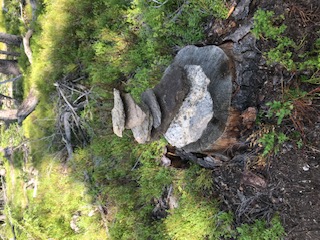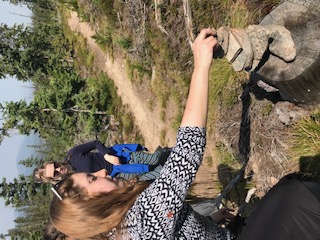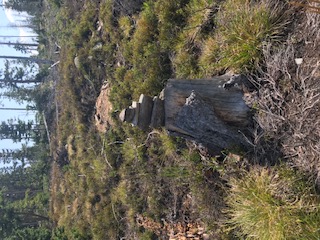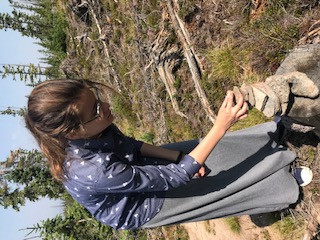The last verses of פרשת בהר deal with עבודה זרה:
לא תעשו לכם אלילם ופסל ומצבה לא תקימו לכם ואבן משכית לא תתנו בארצכם להשתחות עליה; כי אני ה׳ אלקיכם׃
What is an אבן משכית?
ואבן משכית: לְשׁוֹן כִּסּוּי, כְּמוֹ (שמות לג:כב) ”וְשַׂכֹּתִי כַפִּי“, שֶׁמְּכַסִּין הַקַּרְקַע בְּרִצְפַּת אֲבָנִים.
להשתחות עליה: אֲפִלּוּ לַשָּׁמַיִם, לְפִי שֶׁהִשְׁתַּחֲוָאָה בְּפִשּׁוּט יָדַיִם וְרַגְלַיִם הִיא וְאָסְרָה תוֹרָה לַעֲשׂוֹת כֵּן חוּץ מִן הַמִּקְדָּשׁ.
So we take this אבן משכית prohibition very seriously. We don’t prostrate ourselves in shul, we rarely even kneel, we don’t have tile or stone floors in shul, and when we do kneel on our carpeted floors, we put paper towels down so it doesn’t even look like we’re kneeling on the floor.
But how does this connect to the rest of the parasha, about the financial-religious laws of שמיטה, אונאה and עבדות?
Rashi connects it to the paragraph immediately above:
מז וכי תשיג יד גר ותושב עמך ומך אחיך עמו; ונמכר לגר תושב עמך או לעקר משפחת גר׃
…נד ואם לא יגאל באלה ויצא בשנת היבל הוא ובניו עמו׃
נה כי לי בני ישראל עבדים עבדי הם אשר הוצאתי אותם מארץ מצרים; אני ה׳ אלקיכם׃
לא תעשו לכם אלילם: כנגד זה הנמכר לגוי, שלא יאמר הואיל ורבי מגלה עריות אף אני כמותו, הואיל ורבי עובד עבודה זרה אף אני כמותו, הואיל ורבי מחלל שבת אף אני כמותו.
But Rabbi Norman Lamm, former president of Yeshiva University, has a different perspective on the connection to our parasha that relates to a very different understanding of אבן משכית, the “covering stone”.
לא תתנו בארצכם: זה משפט עבודת כוכבים במרקולים.
This comes from the Sifra:
לא תקימו: אילו המרקוליס שעל גבי הדרכים.
What is a מרקוליס on the side of the road?
העובד עבודה זרה—אחד העובד, ואחד המזבח, ואחד המקטר, ואחד המנסך, ואחד המשתחווה, והמקבלו עליו באלוה, והאומר לו אלי אתה…והזורק אבן למרקוליס, זו היא עבודתו.
מרקוליס: מצדדין שלש אבנים אחת מכאן ואחת מכאן ואחת מלמעלה על גביהן וקורין אותם מרקוליס ועובדין אותה בזריקת האבנים.
זריקת האבנים here doesn’t mean throwing stones but piling them on top. A מרקוליס is a stack of stones on the side of the road, and passers-by would add stones to the pile. The assumption is that מרקוליס is Mercury, the god of merchants and travelers:
- Mercury
- “the Roman god Mercury,” …originally a god of tradesmen and thieves, from merx ”merchandise“…Mercury later was identified with Greek Hermes…
- Hermes
- Olympian messenger and god of commerce, markets, and roads; protector of herdsmen, travelers, and rogues; giver of good luck, god of secret dealings, and conductor of the dead. from Greek Hermes, a word of unknown origin. He was identified by the Romans with their Mercury.
When we went hiking in the Rockies a few years ago, these rock piles were all over the trails:

They look innocent, just helpful trail markers or fun ways of saying “I was here” (the latter makes conservationists very upset; you should leave nature the way you found it). But it’s a very short step from appreciating the help that a trail marker offers a traveler, to appreciating the god of travelers.
Stacked rocks, more commonly known as Cairns, placed along the trail signify that you are on the right track.
…
Another reason why people today stack stones are for a spiritual purpose. Supposedly, native cultures have also used stone stacks to honor deities and remember the dead. A Buddhist writer defined cairns as a form of worship and a way to commune with the forces of nature to ask for balance in life. It may probably be the reason why there are a group of people who believe that stones are a vehicle for prayers.
And so זורק אבן למרקוליס is forbidden:
אבני בית מרקוליס במה יאסרו?…נעשה כמגדל עבודת כוכבים.
כמגדל עבודת כוכבים: התוספת על המרקוליס קטן ליעשות מרקוליס גדול ואיסורו משום עבודת כוכבים עצמה.
When we went hiking, I didn’t know any of this, so I am afraid we may have been עובד עבודה זרה בשגגה:

We’ll have to ask Eliyahu when he comes if we need to bring a קרבן חטאת. But זורק אבן למרקוליס becomes a byword in the Talmud for exactly this problem, an innocent, even helpful act that in effect denies ה׳'s providence:
”זורק אבן למרקוליס“ הוא פתגם תלמודי שבא לתאר מי שהתכוון לטוב ונמצא עושה רעה.
…דוגמה לשימוש בביטוי זה נמצאת בתלמוד הבבלי, מסכת חולין (קלג,א), בה נאמר: ”כל השונה לתלמיד שאינו הגון, כזורק אבן למרקוליס“. ועוד על דרך זו נאמר בתוספתא (עבודה זרה פ״ז סוף): ”כשם שזורק אבן למרקוליס עובד עבודה זרה, כך כל המכבד רשע כאלו עובד עבודה זרה“.
שני הביטויים באים לתאר אדם שהתכוון לטוב, ונמצא עושה רע…
Back to our parasha. Rabbi Lamm says that the warning about מרקוליס is about not serving the god of merchants when we engage in the financial transactions described earlier:
And with this interpretation of the Sages, the Biblical passage assumes new dimensions and becomes extremely meaningful to Jews of all times, and for us as well. For Mercury, Markulis, was the pagan god of the merchants, the idol of commerce. And what the Torah thus tells us is that if Torah is to be just ceremony…and not a way of life which governs our conduct in business and trade as well as in shul—then we are no better than the worshippers of Markulis. For if G-d and Torah have no place in the professional life and business life of the Jew, then such a Jew is in effect worshipping business and trade as an end in itself, a devout communicant in the cult of Mercury, god of commerce.
This is the challenge of today’s sidra: either G-d or Mercury. There is no middle position. Either you are a Jew all day and all week, or you are a pagan even when covered by a big tallis.
…Everyone is against dishonesty and for good citizenship. But that is perhaps why the peculiar form of religious service of the idol Mercury was stoning him. You served Mercury by throwing rocks at him—in other words, when you denounce dishonesty, when you reject open lack of ethics, but at the same time immunize business life from the word of Torah—you are still worshipping the idol! Yes, even when throwing rocks at Mercury one worships him, provided that his domain—business and commerce—is kept out of G-d’s jurisdiction.
There’s another side of worshipping Mercury or Hermes that matters to me:
- hermeneutic
- “interpretive,”…from hermeneuein ”to interpret (foreign languages); interpret into words, give utterance to,“ a word of unknown origin (formerly considered ultimately a derivative of Hermes, as the tutelary divinity of speech, writing, and eloquence).
In Greek mythology, Hermes relays divine tidings to mortals. While there is little evidence for the still popular etymology that the word hermaneutics derives from Hermes, he nevertheless provides a useful emblem for our definition of hermaneutics. Interpretation does involve the deciphering of unclear messages. It is essentially an act of mediation, or translation, and Hermes, who was also described as an eloquent speaker and cunning trickster, represents the need for translation of difficult communications…The divine figure of Hermes suggests that interpretation is driven by our desire to grasp the existential import of what we are trying to understand.
I study תנ״ך. Understanding תנ״ך is “Biblical Hermeneutics”. It’s what I do. And the academic tools of “hermenautics” in general, the way we understand poetry and prose, can be useful. But it is dangerous. It has to be לשם שמים or it is tantamount to עבודה זרה.
…מוכח דחכמת יוונית אסורה ללמוד מפני שכתוב ”והגית בה יומם ולילה“. אבל נראה דחכמת יוונית
דהתם איירי חכמה שאין לה שייכות אל התורה כלל, כמו חכמה שהיא במליצה או משל ואת אלה לא שייכות כלל אל התורה. אבל החכמות לעמוד על המציאות וסדר העולם בודאי מותר ללמוד…
ומפני כי דברים זה אין בו תועלת להבין חכמת התורה ולכך אסרוה, אבל דברי חכמה אינו אסור כי החכמה הזאת היא כמו סולם לעלות בה אל חכמת התורה… ומזה נלמוד כי כל דבר שהוא
לעמוד על מהות העולם יש לאדם ללמוד, ומחוייב הוא בזה, כי הכל מעשה השם הוא ויש לעמוד עליהם ולהכיר על ידי זה
בוראו…
But we do use חכמה שהיא במליצה או משל as a סולם לעלות בה אל חכמת התורה. As Rabbi Carmy says:
I call my
own derekh ha-limmud a literary-theological approach…By theological, we assert the conviction that Bible is to be
encountered as the word of G-d, rather than primarily as the object of academic
investigation; we also refer to the authoritative presence of the interpretive
tradition. The adjective literary comes to stress that understanding
the word of G-d is not only a matter of apprehending propositions, but
also of hearing them in their literary and historical context…
What we build with these bricks of hermeneutics cannot be a cairn to Hermes, a מרקולים, but a palace of Torah:
And in general, this is an important rule in the struggle of ideas: we should not immediately refute any idea which comes to contradict anything in the Torah, but rather we should build the palace of Torah above it; in so doing we are exalted by the Torah, and through this exaltation the ideas are revealed, and thereafter, when we are not pressured by anything, we can confidently also struggle against it.

